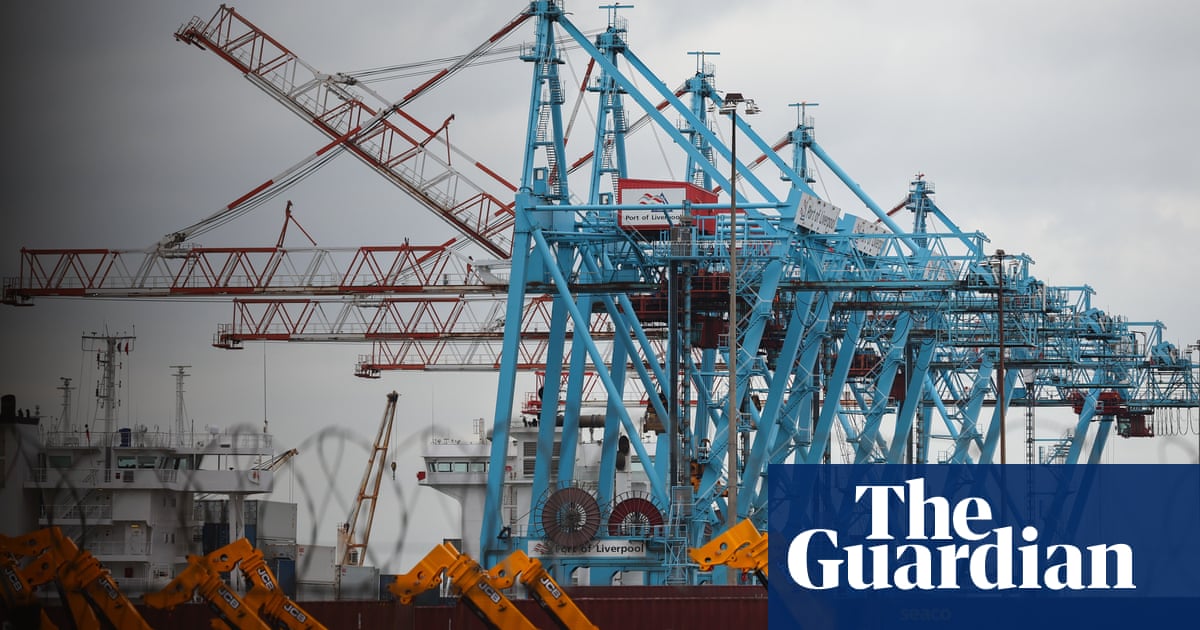“We’re vulnerable at the moment,” says Fiona Conor, the managing director of Trust Electric Heating, a Leeds-based radiator manufacturer, who has been considering expanding into the US market.
After a predictably unpredictable start to Donald Trump’s second term as US president, Conor is worried her options could be limited, as businesses across the UK brace for a global trade war.
Business leaders are hoping that Britain can avoid sweeping US tariffs, but experts warn that the fragmentation of the international trading order would still have a chilling impact on a relatively small, open economy such as the UK’s. Highlighting that danger, Trump’s 25% tariffs on steel and aluminium announced this week – including on UK exporters – could hit British industry hard when they come into effect in early March.
As the owner of a fast-growing business, Conor has been flying back and forth between Leeds and New York in recent months, building links in the world’s largest economy to sell her family-owned firm’s award-winning electric radiators.
“Now with this tariff threat, I’m hoping Keir Starmer puts his big boy pants on and has some strong negotiating skills. I would be getting over there, looking in the whites of [Trump’s] eyes, shaking his hand and getting this deal done,” she says.
The US is the single largest individual country trading partner for the UK, in a relationship worth almost £300bn a year. Most is in services, largely involving banks, law firms and accountancies in the City of London and on Wall Street, which are not subject to tariffs. Foreign direct investment between the two countries totals more than £1tn.
UK goods exports – dominated by cars, medicinal and pharmaceutical products, mechanical power generators and scientific instruments – were worth £58bn in the year to the end of September 2024. Goods imported from the US were worth just £2bn less, led by oil, and generators.
As Trump targets US allies and enemies alike with tariffs, Starmer’s government has sought to cosy up to the president, while also rebuilding ties with the EU after Brexit. The prime minister is due to visit Trump later this month, while UK ministers curried favour with the White House this week by joining the US in refusing to sign an artificial intelligence accord at a landmark Paris summit.
Often striking a softer tone than other world leaders, some economists believe Starmer’s strategy could pay off, as he uses Britain’s post-Brexit independence to negotiate on trade with the US, EU and China. However, others warn Britain outside the EU is in a weaker position, and will ultimately need to pick a side.
Rhys Davies, a former government trade adviser, now at the consultancy firm Flint Global, says: “The size of the UK economy, and its high openness to trade means that if it does come under pressure its ability to retaliate in a genuinely meaningful way is limited.
“While the UK will look to prepare countermeasures that are carefully calibrated for maximum political impact – and strengthen broader trade relations – the best hope is to fly under the radar while Trump looks at the countries with which the US has consistent trade deficits.”
Trump has largely focused attention on Canada, Mexico and China, which export significantly more to the US than they import. Britain has a more balanced trading relationship with the US.
Starmer could also rely on a statistical quirk. US figures have shown it has a surplus in trade in goods with the UK of about $12bn (£9.6bn), but the UK has reported a surplus with the US of about £2bn. The Office for National Statistics blames the mismatch partly on territorial definitions, with the US data including crown dependencies, unlike the UK.
However, business leaders are still worried about the risk of a characteristically tempestuous turn from the US president. Research by the British Chambers of Commerce shows 63% of manufacturers believe exports will be affected by US tariffs.
Another company that finds itself squarely in the line of fire is Europlaz Technologies, an Essex-based manufacturer of high-precision products to the medical devices industry. The US market is the single largest destination for UK exports of scientific instruments, worth almost £3bn in 2023.
after newsletter promotion
Rory O’Keeffe, the commercial director at Europlaz Technologies, says Trump’s “sledgehammer” approach could result in a “commercial earthquake” for his firm.
“Three of our largest customers have a heavy presence in the US, and many of our UK-based clients rely on the American market for the lion’s share of their sales. The reality is that tariffs will mean higher costs and higher costs mean higher prices, and diminished competitiveness,” he says.
Ed Davey, the Liberal Democrat leader, urged Starmer on Wednesday to impose “Tesla tariffs” if Trump pushes ahead with plans to hit the UK steel industry.
“Sitting back and hoping Trump won’t hurt us just isn’t going to work. The only way we can tackle Trump and [Elon] Musk is by negotiating from a position of strength and showing that the UK will not be bullied from across the pond,” he said.
Even if the UK manages to avoid specific tariffs, experts warn that a broader slowdown in international trade will hurt the UK. Global supply chains mean UK firms could still be hit by US tariffs on other countries – such as manufacturers shipping components to Mexico or the EU, which are used to make finished products exported to the US market.
“The slowdown in other regions which could have more of a dampening effect on the UK, rather than the effective tariffs themselves,” Anthony O’Brien, the head of market strategy at Phoenix Group, says.
How the UK responds could also be important. Free market economists have urged Starmer not to retaliate if Trump targets Britain, arguing that while UK exporters would be hit, British consumers would avoid higher prices for US goods.
Still, such an outcome would hit the UK economy. The Bank of England, which is monitoring the situation closely, has warned that anything unpicking global trade is bad for growth. Business investment could be put on ice, while US tariffs on other countries, including China – the world’s largest exporter – could lead to the diversion of its products to Britain, flooding the market.
John Glen, chief economist at the Chartered Institute of Procurement and Supply, says that Britain is in a tight spot. “We have the opportunity [post-Brexit] to stand alone and negotiate an agreement with Trump. Would he be willing to do that? I don’t know. Would we be in a strong position to negotiate? I don’t think so. Could we act as a mediator between EU and US, very much so.”
Article by:Source: Richard Partington Economics correspondent














